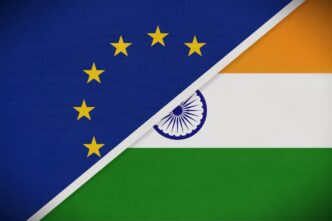Executive Summary
The Story So Far
Why This Matters
Who Thinks What?
The European Union and India are intensifying efforts to finalize a comprehensive free trade agreement by the end of the year, with negotiations reportedly gaining significant momentum amidst concerns over potential U.S. tariffs under President Donald Trump. Brussels has outlined extensive areas for future cooperation, including investment protection, air transport, and collaborative initiatives in Africa and South Asia, as both blocs seek to deepen their economic and diplomatic ties.
Accelerated Negotiations
Negotiations between the EU and India, which were officially relaunched in 2022 after an eight-year hiatus, have seen an acceleration in pace. This renewed urgency is largely attributed to the re-election of U.S. President Donald Trump, prompting both sides to proactively foster new alliances in anticipation of potential protectionist trade policies from Washington.
The EU views India as a crucial economic and diplomatic partner within its broader strategy to diversify global trade relationships. This initiative forms part of a wider push by the bloc to secure trade agreements with other key global players, including Mexico, Mercosur, and Indonesia.
Geopolitical Dynamics and Trade
While India holds a positive view of the EU, it also maintains significant economic and strategic ties with other major powers, including China and Russia. Notably, India has increased its purchases of Russian oil since 2022, a move that has drawn international scrutiny following Russia’s invasion of Ukraine.
Addressing these geopolitical complexities, EU foreign policy chief Kaja Kallas acknowledged existing areas of disagreement with India but affirmed the bloc’s intention not to isolate New Delhi or push it towards Russia. The EU plans to engage further with India on efforts to curtail Russia’s military capabilities and prevent the circumvention of EU sanctions.
Broad Scope of Cooperation
Beyond the core free trade deal, the EU envisages deeper cooperation with India across several critical sectors. These include agreements on investment protection, air transport, and collaborative efforts to secure supply chains.
Further areas of planned engagement encompass initiatives in green hydrogen, the decarbonization of heavy industry, and enhanced research and innovation. Discussions are also underway for a potential defense and security partnership, highlighting the strategic depth of the envisioned EU-India relationship.
The accelerated push for an EU-India trade deal underscores a mutual strategic imperative to diversify economic partnerships and navigate a shifting global trade landscape. Despite existing geopolitical complexities, both blocs appear committed to forging a comprehensive agreement that could significantly redefine their economic and diplomatic alignment on the international stage.








